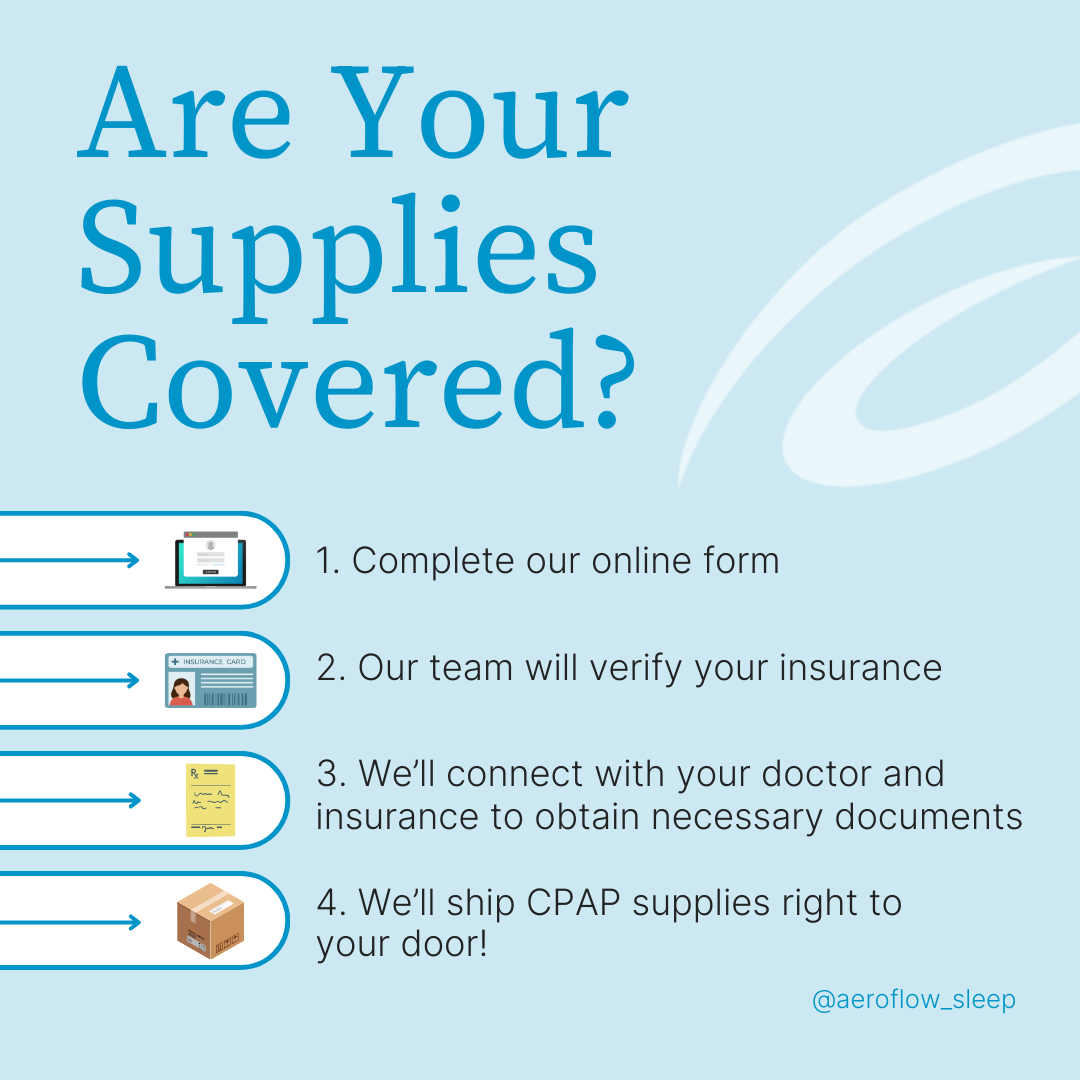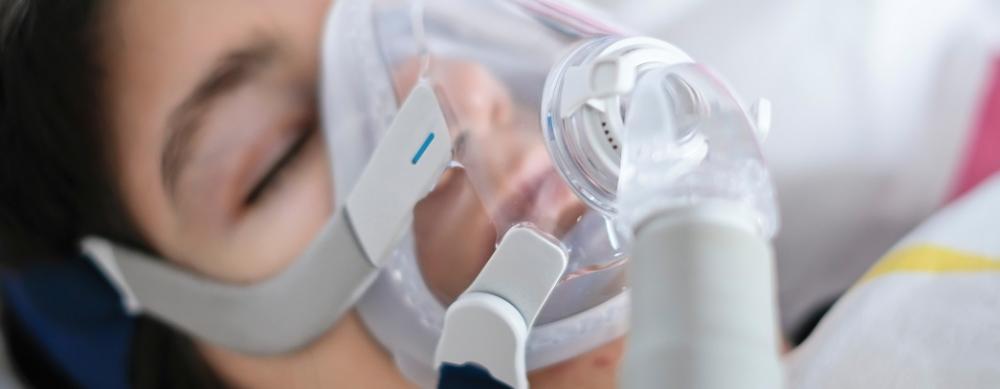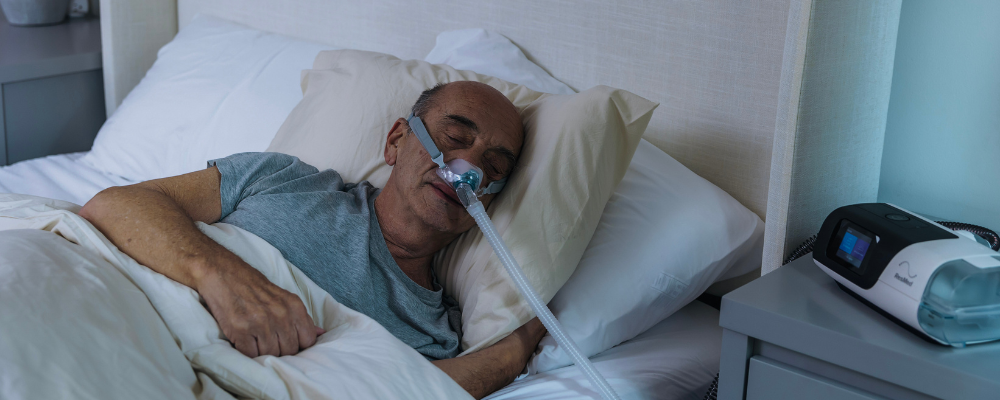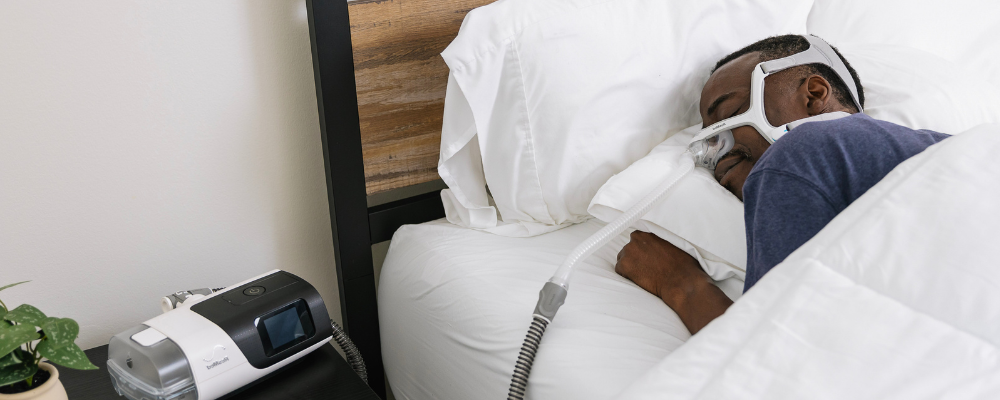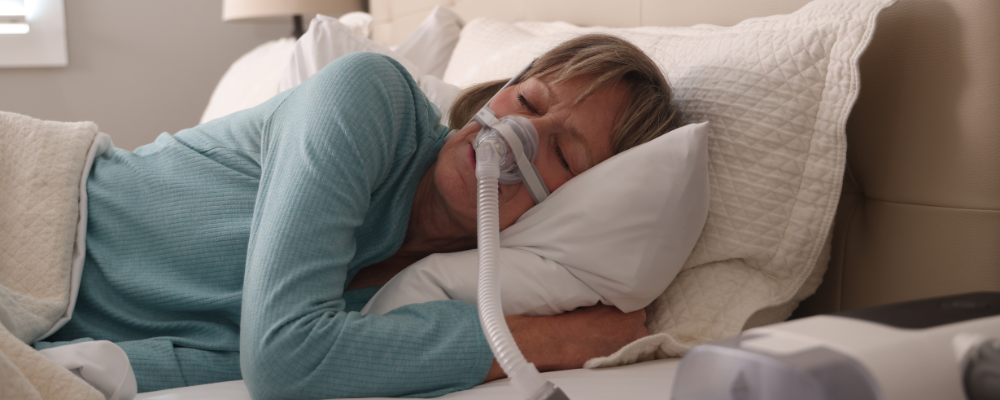When you’re first diagnosed with sleep apnea, the process of getting a CPAP machine can seem daunting. Do you need to spend a night in a sleep lab? Where’s the best place to buy a CPAP and is it online? But most importantly, do CPAP machines need a prescription? Take a deep breath! Aeroflow Sleep has written this guide to simplify the process of getting a CPAP prescription and, ultimately, getting your new CPAP machine.
How To Get A CPAP Machine
Thanks to advances in technology, getting a CPAP machine has never been easier! But even if you buy your CPAP equipment online (or via a brick-and-mortar retailer,) there’s still a process you have to follow to get the proper sleep apnea therapy; a CPAP machine without the right pressure settings is useless, and CPAP therapy without a properly fitting CPAP mask can be detrimental too. So, where do you begin?
To summarize, you’ll need to:
- Ask Your Doctor For A Sleep Study
- Get A Prescription For CPAP Supplies
- Test Out Your CPAP Device
Can I Buy A CPAP Machine Without A Sleep Study?
No, you should not buy a CPAP machine without a sleep study. While there are options out there, it’s not in your best interest to put your sleep health in the hands of a used machine seller, any entity without the backing of the Food And Drug Administration (FDA,) and especially Facebook Marketplace. You want a valid prescription for your CPAP machine, especially if you plan to file an insurance claim for the medical device, so you want a sleep study.


When you do undergo a sleep study, don’t worry; sleep tests have come a long way since the lab. You can now take an at home sleep test in the comfort of your own home! Just be sure that your insurance takes the results of a home sleep study seriously; some insurance companies won’t cover the cost of your CPAP supplies without an in-lab study due to the accuracy of the test and whether it was successfully supervised by a healthcare provider.
Your sleep apnea diagnosis will then be confirmed with the results of the sleep study. Based on how your apneas occur, your doctor will reveal your type of sleep apnea. There are three types of sleep apnea: obstructive sleep apnea (OSA,) central sleep apnea (CSA,) and mixed sleep apnea. Each sleep disorder requires a different form of treatment, but we’ll cover that in the next section.
How Do I Get A CPAP Prescription?
You are now ready to invest in some medical equipment! Which sleep apnea you have determines which sleep apnea treatment you should pursue; such as a CPAP, BiPAP ASV, or BiPAP machine. Your sleep doctor who ordered the test will evaluate your sleep study or home sleep apnea test and ultimately determine which device(s) to write a prescription for.
The 3 Types Of CPAP Machines
Like the 3 types of sleep apnea, there are also 3 types of CPAP machines. The most common is continuous positive airway pressure (CPAP,) which pushes either a stream of fixed, pressured air or varying levels of pressurized air through the machine, into the tube, and up to your nose and/or mouth to breathe in, keeping your airways open while you sleep.
BiPAP machines, or bilevel, offer two pressure settings that the machine alternates between when you inhale or exhale, and this is where a prescription matters. Michelle Worley, Director of Clinical Operations at Aeroflow Sleep and Registered Nurse, explains, “Your doctor is really responsible for prescribing the pressure settings; if you have difficulty tolerating one pressure, or your apnea isn’t controlled with CPAP, your doctor will prescribe BiPAP.” Patients who use a BiPAP often have more severe OSA symptoms or have been diagnosed with CSA.
“Your doctor is really responsible for prescribing the pressure settings; if you have difficulty tolerating one pressure, or your apnea isn’t controlled with CPAP, your doctor will prescribe BiPAP.” - Michelle Worley, RN
Finally, a BiPAP ASV is the third possible prescription required, meaning your pressure settings are actually prescribed within a total range of pressures that may be used to combat certain side effects, fluctuating automatically as your breathing pattern changes throughout the night.
But wait...what about APAP machines? CPAP and BiPAP machines both have auto-titrating technology these days, which is essentially what an APAP does exclusively, so we’re omitting this option for the purpose of the varying types of prescription machines. You can still ask your doctor or Aeroflow Sleep Specialist for an APAP machine.
No matter which machine you use, all you have to do to get a CPAP prescription is to speak with your doctor, get a sleep study, and schedule your follow-up appointment.
What CPAP Items Require A Prescription?
You will need more than just a CPAP machine; you’ll want CPAP items—like the CPAP mask and connecting tube and water chambers—to make the entire setup run smoothly. Your doctor will also provide you with a prescription for these, but remember that third step in how to get your CPAP machine? You’ll want to test a few options and combinations to ensure you’re getting the most comfortable treatment possible.
Look at three key pieces when requesting CPAP items that require a prescription:
- CPAP Masks: Full-Face, Nasal, or Nasal Pillows
- Tubing: Standard or Heated
- Water Chambers & Humidifiers
First and foremost, there are a variety of CPAP mask shapes and sizes. There are even different model years in the same series (ex: ResMed AirFit) that, despite being a decade old or brand new, have features and benefits that may impact your overall sleep quality compared to something else. Determine what your preferred CPAP mask type is first, and then you can move on to mask parts: headgear, cushions, etc. Mask parts will also come standard with your preferred mask type and can be prescribed accordingly.
Next, tubing comes in two typical formats: standard or heated. Standard is exactly what it sounds like; it’s what will be packed up with the machine you receive, so there’s no hassle needed in getting another right away. Heated tubing is your second option, used to prevent water from building up in the bend of your hose.
Finally, the last two parts are water chambers and humidifiers. The former are the tubs you fill with distilled water, and they are how the pressure itself turns to air. Think about how condensation is formed; same process. The latter uses the water you place in the water chamber to create humidity and prevent dryness; these are especially great if you need a little extra heat to raise the temperature and moisten the air you’re breathing. And yes, you can use both a heated tube and heated humidifier together if your doctor recommends it.
Pieces that are less important and do not require a prescription (and will not be covered through insurance) include CPAP cleaners and comfort products.
When To Speak To Your Doctor
We understand if all of this still feels scary, especially addressing it for the first time with your doctor. A couple of pointers… You really want to be asking yourself what sort of sleep apnea symptoms you may be experiencing and have those ready when you see the doctor.
Ask yourself: Are you noticing daytime sleepiness, cognitive issues, a dry mouth, or sore throat? Also, ask your bed partner: are you snoring loudly, waking up gasping for air in the middle of the night, or having long pauses in breathing while asleep?
These are all reasons to consult your doctor for a sleep study, a CPAP prescription, and more! Plus, seeing the doctor’s office notes from when you did speak to a medical doctor is the first thing a health insurance provider will need in order to cover your CPAP machine through insurance.
Where To Buy A CPAP Machine
There’s an entire Quora thread dedicated to getting a new prescription (and buying a CPAP machine.) One user writes, “If you choose to purchase a machine online (you can get many cheap deals there) or from a vendor, the question is who decides on the settings.” Michelle also cautions, “If you don’t have the right settings, it’s the same as not using a machine at all. This is why it is important [that] the treating doctor writes the prescription.”
Continuing from the Quora thread, “The bottom line, you have to know what you are treating before deciding how to set up your CPAP machine. Then, you have to have someone follow the readings from the data card of the machine or get a report from [a] modem analyzing how you are doing with the present settings, and make adjustments if needed. This is only the machine…masks, heated tubes, chinstrips, and other supplies, if you are going to go at it alone—I do not make the case that most doctors, unless [sleep] specialists know much more than you—there is a lot you should know.”
We couldn’t have said it better! Aeroflow Sleep can be that Sleep Specialist that prevents you from going at it alone, because there’s obviously plenty to consider. Don’t rush to the checkout counter just because you want the instant gratification of getting a CPAP machine on your nightstand. That’s a surefire way to have it collect dust and not serve you well. We’ll take the time to accurately process your prescription and verify your private health insurance, Medicare, or Medicaid cover every piece.
Order your CPAP supplies from Aeroflow Sleep and ensure the proper prescription requirements, documentation, clinical setups, and more are here to set you up for sleep apnea success! It only takes a few minutes to sign up, and then we’ll take care of everything.



